School Highlights
Richland College serves 20,548 students (20% of students are full-time).
The college's student:teacher ratio of 22:1 is lower than the state community college average of 23:1.
Minority enrollment is 80% of the student body (majority Hispanic), which is more than the state average of 74%.
Quick Stats (2025)
- Enrollment: 20,548 students
- In-state tuition: $2,664
- Out-state tuition: $4,176
- Acceptance Rate: 100%
- Student:teacher ratio: 22:1
- Minority enrollment: 80%
- Source: Verified school update
Top Rankings
Richland College ranks among the top 20% of public schools in Texas for:
Category
Attribute
Affordability
Diversity
Community Size
Completion Rates
School Overview
The teacher population of 928 teachers has stayed relatively flat over five years.
Richland College
(TX) Community College Avg.
Carnegie Classification
Associate's Colleges: High Transfer-High Nontraditional
Baccalaureate/Associate's Colleges: Associate's Dominant
Institution Level
At least 2 but less than 4 years
At least 2 but less than 4 years
Institution Control
Public
Private, for profit
Total Faculty
928 staff
262 staff
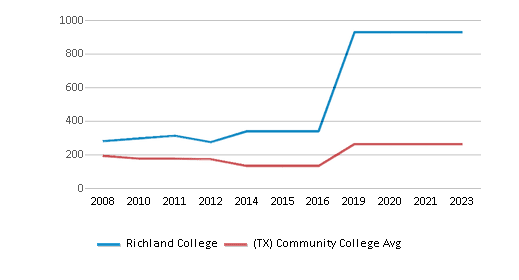
School Calendar
Student Body
The student population of Richland College has stayed relatively flat over five years.
The student:teacher ratio of 22:1 has stayed the same over five years.
The Richland College diversity score of 0.75 is more than the state average of 0.70. The school's diversity has stayed relatively flat over five years.
Total Enrollment
20,548 students
1,396 students
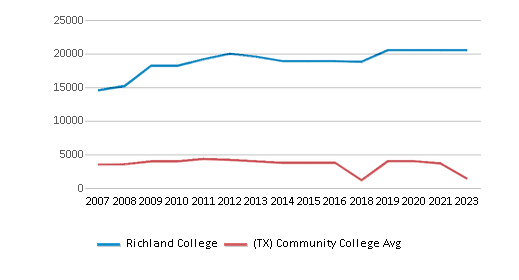
Student : Teacher Ratio
22:1
23:1
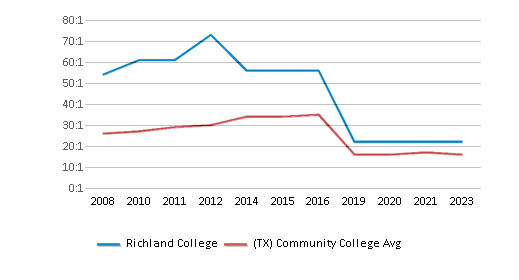
# Full-Time Students
4,195 students
890 students
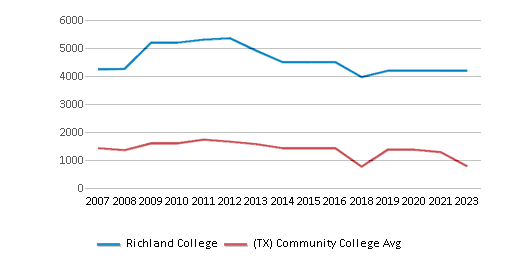
# Part-Time Students
16,353 students
4,022 students
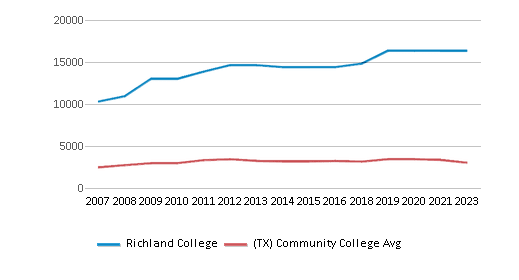
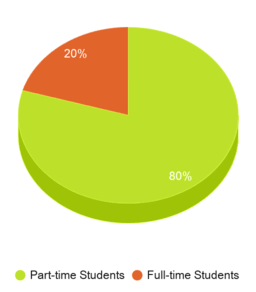
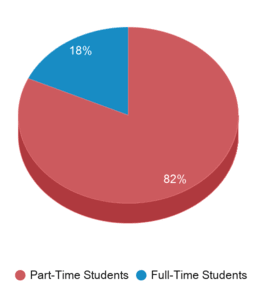
# Enrollment Undergraduate
116 students
403 students
# Full-Time Undergraduate Students
4,195 students
890 students
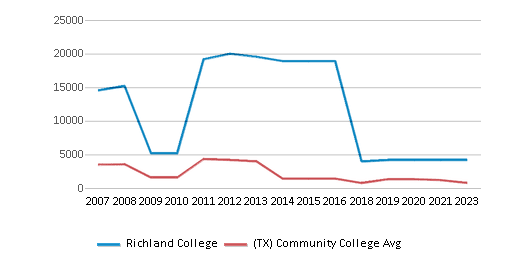
# Full-Time Graduate Students
n/a
40 students
# Part-Time Undergraduate Students
16,353 students
4,022 students
# Part-Time Graduate Students
n/a
47 students
Total Dormitory Capacity
n/a
252 students
% Asian
14%
6%
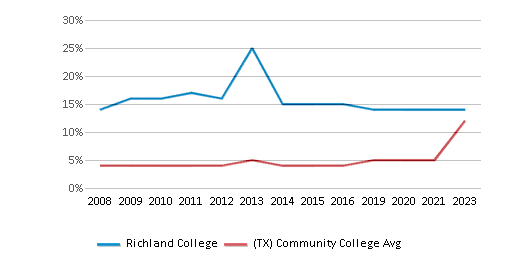
% Hispanic
39%
46%
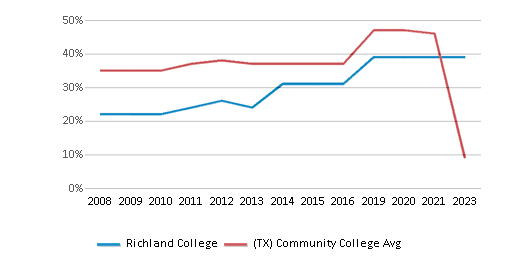
% Black
19%
14%
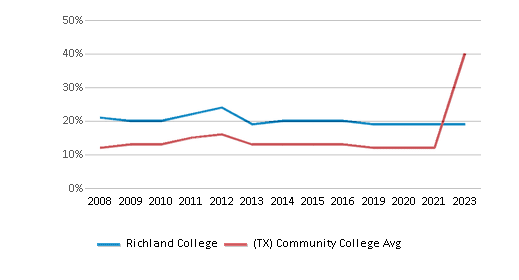
% White
20%
26%
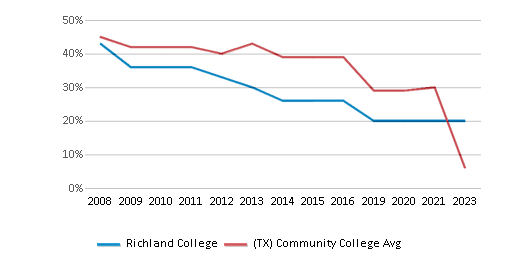
% Two or more races
2%
3%
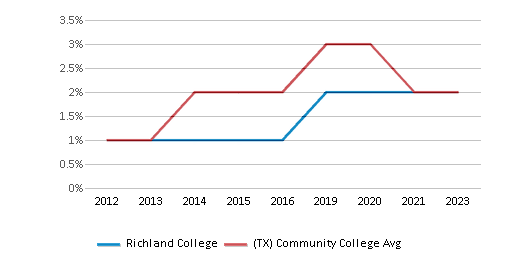
% Non Resident races
n/a
2%
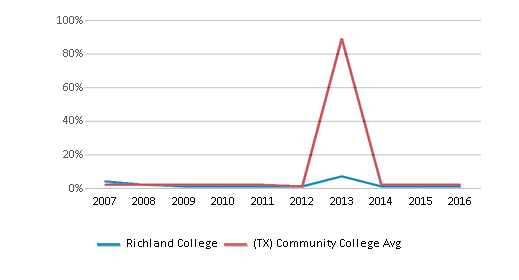
% Unknown races
5%
3%
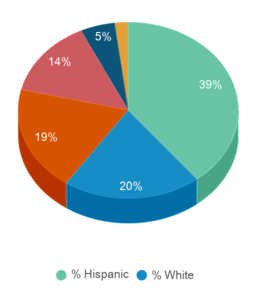
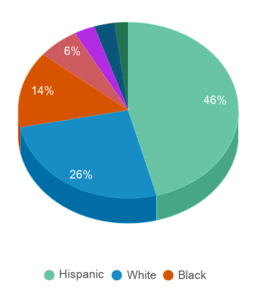
Diversity Score
0.75
0.70
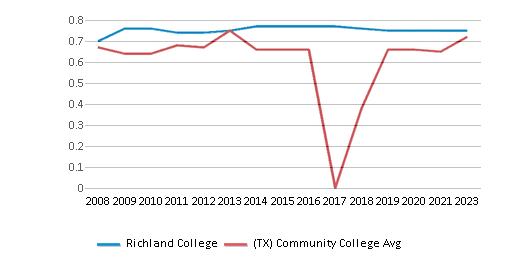
College Completion Rate (Students who graduate in less than 4 years)
5%
0.5469%
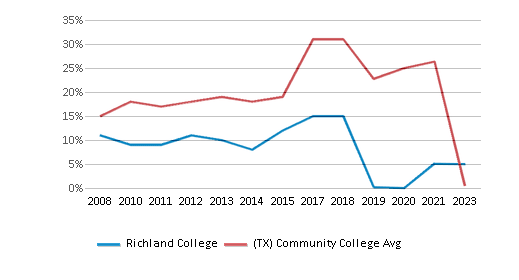
College Completion Rate (Students who graduate in 4 years or more than 4 years)
n/a
0.3357%
Average Graduate Earnings (10 Years)
$39,200
$34,600
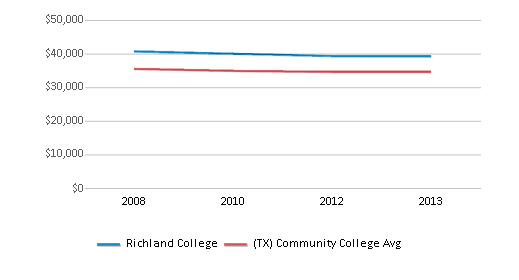
Tuition and Acceptance Rate
The public in-state tuition of $2,664 is less than the state average of $3,316. The in-state tuition has declined by 20% over four years.
The public out-state tuition of $4,176 is less than the state average of $5,750. The out-state tuition has declined by 20% over four years.
In-State Tuition Fees
$2,664
$3,316
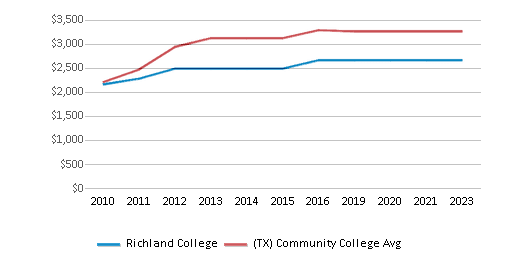
Out-State Tuition Fees
$4,176
$5,750
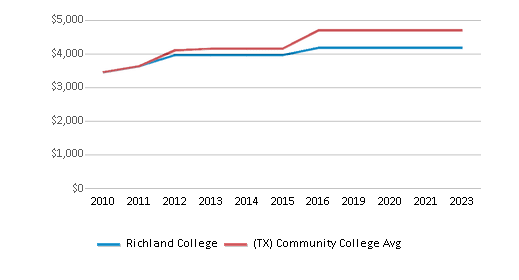
Tuition Notes
2015-2016 Estimated
% Students Receiving Some Financial Aid
51%
84%
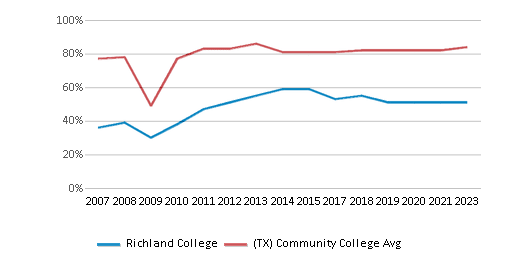
Median Debt for Graduates
$9,033
$10,500
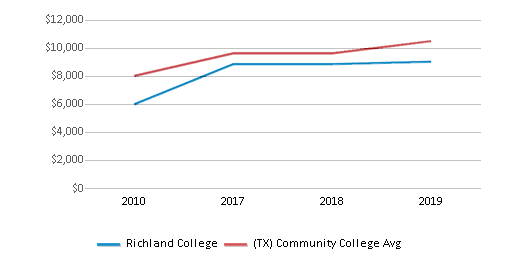
Median Debt for Dropouts
$5,500
$5,500
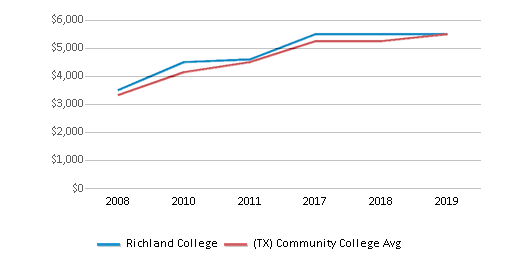
Acceptance Rate
100%
81%
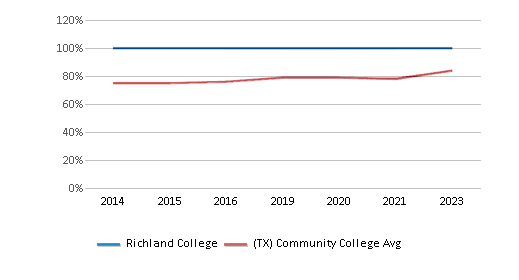
Sports
Total Sports Offered
5 sports
Sports
Baseball, Basketball, Soccer, Volleyball, Wrestling
Extracurriculars
Total ExtracurricularsTotal Extra-curric.
4 extracurriculars
ExtracurricularsExtra-curric.
Club or Organization:
Ambassador or Student Government, Campus Activities Board
Arts and Music Programs:
Choir
Recreational Athletic Programs:
Intramurals
Ambassador or Student Government, Campus Activities Board
Arts and Music Programs:
Choir
Recreational Athletic Programs:
Intramurals
Source: 2023 (or latest year available) Integrated Postsecondary Education Data System (IPEDS) , School Administrators
School Notes
- Richland College was established in 1972. It is one of seven campuses in the Dallas County Community College District. For more than 30 years, Richland College of the Dallas County Community Colleges has focused on teaching, learning and community building. Richland helps students build their future through courses that can be applied to the first two years of a baccalaureate degree, one- or two-year certificates in a number of career fields, and training in the latest technology for students who want to advance in their current careers. The student body of more than 14,000 college credit students and about 5,000 continuing education students at Richland is internationally and ethnically diverse, speaking more than 79 first languages. The college is accredited by the Commission on Colleges of the Southern Association of Colleges & Schools to award the Associate of Arts degree, Associate of Sciences degree and the Associate of Applied Science degree.
Frequently Asked Questions
How much does Richland College cost?
Richland College's tuition is approximately $2,664 for In-State students and $4,176 for Out-State students.
What is the acceptance rate of Richland College?
The acceptance rate of Richland College is 100%, which is higher than the state average of 81%.
What sports does Richland College offer?
Richland College offers 5 interscholastic sports: Baseball, Basketball, Soccer, Volleyball and Wrestling.
What is Richland College's ranking?
Richland College ranks among the top 20% of community college in Texas for: Least expensive tuition, Diversity in US community colleges, Largest student body and Highest completion rates.
In what neighborhood is Richland College located?
Richland College is located in the Lake Highlands neighborhood of Dallas, TX.
Recent Articles

Obtaining Your Bachelor's Degree at a Community College
Explore the evolving landscape of community colleges offering bachelor's degrees, addressing affordability, accessibility, and workforce needs.

A to Z of Community College Certificates and Courses
From business and healthcare to technology and skilled trades, the article showcases the breadth of options available to students seeking to enhance their knowledge, develop new skills, or pursue career advancement.

What is a Community College?
This comprehensive guide explains what a community college is, its history, and its role in higher education. It covers the types of programs offered, differences from four-year colleges, benefits of attending, and important considerations for prospective students, providing valuable insights for those exploring educational options.

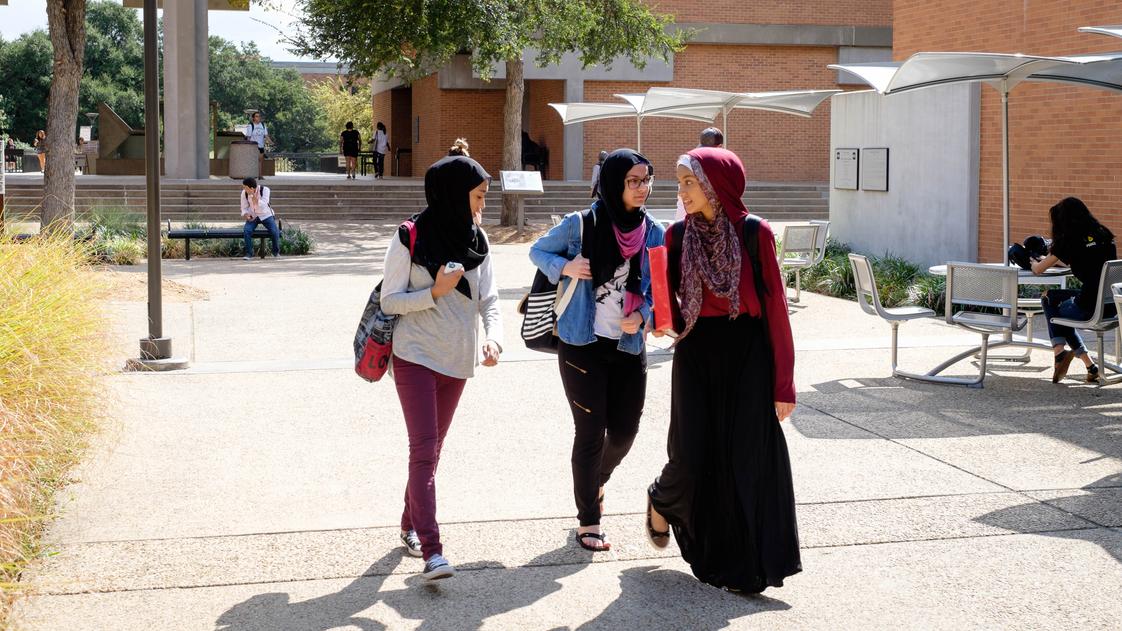

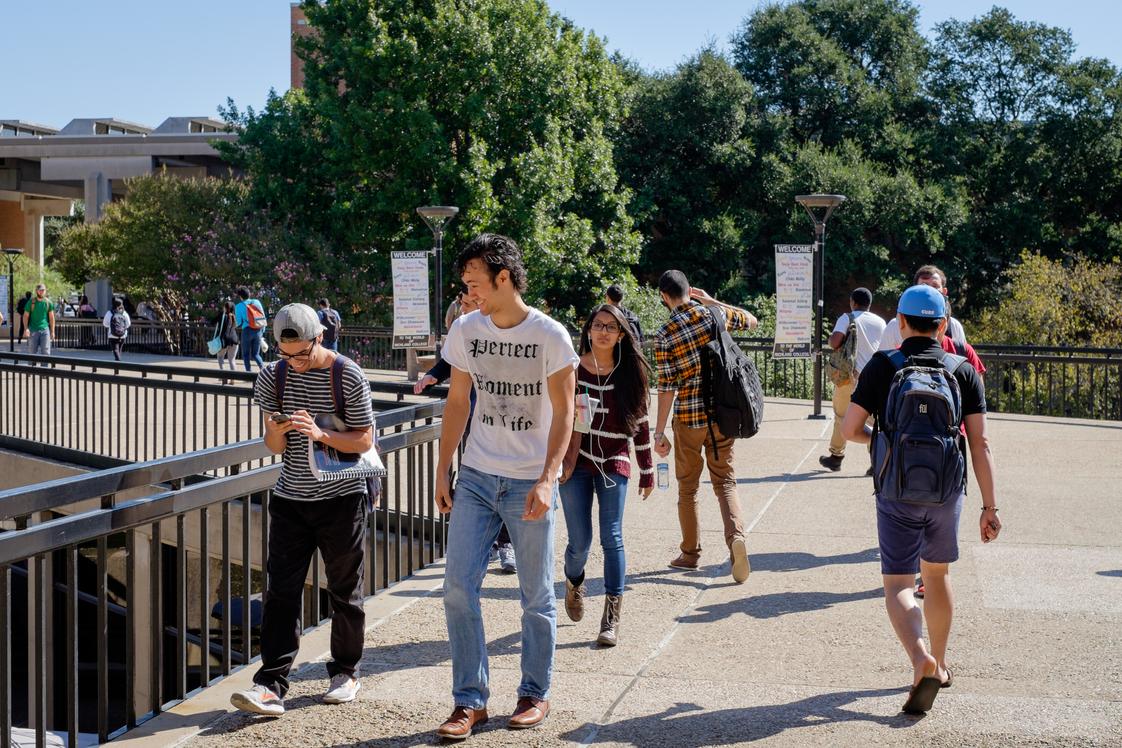



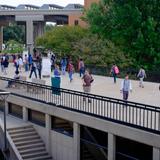





![A full 25 mins video of Richland College. The video includes some outstanding views of the school. "Hope you enjoy the video"
- Although I didn't know some areas of the school, so I didn't film it, and I apologize!Camera used:
- Sony A6
- Iphone 6sFilming date:
- April 6
- April 9
- April 11*The entire video was planned, recorded, and edited by myself (Huy Tran)*
- Inspired and supported by:
+ Triet Nguyen (https://www.youtube.com/channel/UCIXtqE3Pa7MM2Lk8DdJqGuw)
+ Thinh NguyenCurious about songs I used? Here are the links- https://www.youtube.com/watch?v=InrznlrYydU- https://www.youtube.com/watch?v=qMM9wKFSiak&list=LLXfWHvWibXQwiicwiW63Rzw&index=11&t=0s**These music are not owned by me!!** *Richland College* [Full_Version] "Thunderduck Land" (2019)](https://i.ytimg.com/vi/YjFo7pwX-2c/0.jpg)




